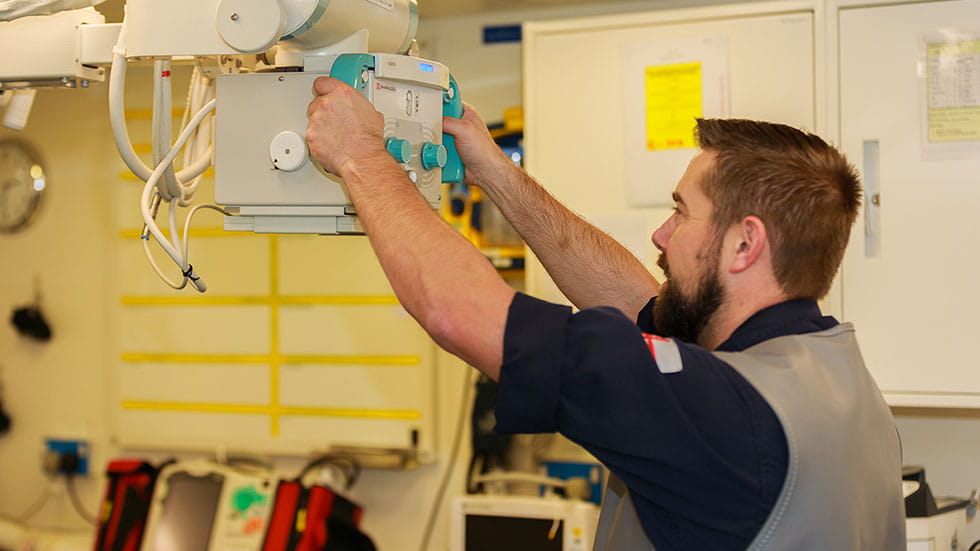Radiographer (Student)
You’ll provide medical support to Royal Navy and Royal Marines personnel all over the world.
- £18,500 - £52,500
- A-Levels / college qualifications
- Surface Fleet
- Medical
- Rating level
£25,200
The minimum amount you'll earn after training
£34,000
Earn over this amount after university and initial training
0%
6 weeks
Free
Travel

Getting paid whilst at university enabled me to focus on my studies and fulfil my potential. My role as a deployed radiographer has enabled me to develop my clinical skills to the highest levels and contribute to the care of our patients around the world.
Role details
What you’ll do
Once you’ve completed 10 weeks Initial Naval Training, you’ll join Birmingham City University to study for your BSc in Diagnostic Radiography, alongside other tri-service students and civilians. After your studies, you’ll join a Joint Hospital Group (JHG) unit in either Plymouth or Birmingham to continue developing your clinical skills and competencies as a qualified Radiographer.
Whether serving at home or abroad, our personnel need the best medical treatment. This can only happen if they get the best medical diagnoses. As a Royal Navy Radiographer you are a critical component to all our medical assets. You could find yourself on a Role 2 Afloat team responding to a humanitarian crisis or on our Maritime Role 3 capability on board RFA Argus, responsible for the provision of Ultrasound, X-ray or CT scans to ensure our clinicians can quickly and accurately assess and treat our patients. You will be working as part of highly specialist multidisciplinary team delivering cutting edge care using the latest in medical innovations.
Your role
- Gain your BSc in Diagnostic Radiography and then apply and develop your clinical skills in diverse environments
- Work within a Joint Hospital Group Unit and be deployed all over the world when needed
- Tailor your career to your ambitions, whether that’s further professional training in ultrasound and CT scanning, or serve with more specialised forces like the Royal Marines
- Be part of a world-class medical service that’s respected far beyond the Armed Forces
Pay & benefits
- A salary that rises to £25,200 after initial training
- Earn in excess of £34,000 after graduating
- Fantastic pay and promotion prospects
- An excellent pension scheme
- Six weeks of paid holiday every year
- Free medical and dental care
- Sport and adventurous training opportunities
Skills for life
Qualifications you'll gain
- BSc (Hons) degree in Diagnostic Radiography
- An opportunity to study further at Degree level 6 and Masters level 7 to top up your professional portfolio
- Leadership and Management qualifications
Skills you'll develop
- How to provide a world-class diagnostic service, wherever you are in the world
- Opportunity for further training in CT and ultrasound
- Learn to be adaptable, flexible and disciplined
Eligibility
- Aged 17 and a half to 39
- Multiple entry points exist to gain 120 UCAS points; check with MSAT PO as not all accepted
- At least 5 GCSEs at grades A-C (9-4) (or Scottish equivalent), which must include English language and Mathematics at grade B/6 or above
- Be a British or Irish national, a Commonwealth citizen, or a Dual National
- A Body Mass Index (BMI) between 18 and 28 (between 17 and 27 if under 18)
- Pass the Naval Swimming Test
Skills & Interests
- Excellent interpersonal and communication skills
- A caring and compassionate nature
- Independent thinking, with the ability to remain calm under pressure
- A highly organised team player
- An adventurous spirit
Joining Process
From picking your role to starting on your first day, these are the steps you'll take to join as a rating.
Submit an application
Defence Aptitude Assessment (DAA)
Interview
Medical and eye tests
Pre-Joining Fitness Test (PJFT)
Radiographer (Student) Assessment Board
Royal Navy Acquaint Course (RNAC)
Start training
Career Progression
Got a question?
Our virtual recruiter is available to answer your questions 24 hours a day
